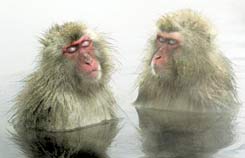
When two monkeys fight, the policeman comes and separates them * macaque monkeys. The "cops" place themselves between two hawk monkeys and threaten both equally
Most people have mixed feelings about police officers. On the one hand, they protect life and property. On the other hand, you don't want to meet them when your foot accidentally presses too hard on the gas pedal. Be that as it may, few would argue that human society can manage without police officers. Even in small villages, where everyone knows everyone and crime is minimal, the local policeman is an essential and reassuring presence.
Is policing the property of humans only? No, claim Dr. Jessica Fleck from the Santa Fe Institute in New Mexico and her colleagues. According to them, even in the society of monkeys there are individuals who function as policemen. And when these officers are not in the field, the lives of the monkeys become much less happy.
The police forces in the society of the monkeys are small groups of individuals with a high social status. What differentiates the "cops" from ordinary "alpha" males and females is that they are not content with protecting their own interests. They do that too, of course, but they also help settle conflicts between individuals lower than them in the social hierarchy, in which they have no interests whatsoever.
Dr. Fleck and her colleagues discovered this behavior in a previous study. Their new study, which focused on pig-tailed macaques and was published last week in the journal "Nature", examined how important policing is to maintaining social harmony. To do this, Dr. Fleck used a research method used mainly by geneticists. These usually silence a certain gene and see what effect silencing has on the biochemical mechanism of the cell. Fleck did a similar thing: she removed the monkeys who act as police officers from the group in which they live and examined how this affects the social fabric in the group.
The group Fleck tested included 84 individuals, 45 of which were adults. Towards four individuals - three males and one female - the monkeys in the group showed submissive behavior. These four individuals, Fleck observed, served as a police force and used to intervene in fights between monkeys in the group. They placed themselves between two hawk monkeys and threatened both equally - they showed no preference towards either of them.
To assess the impact of the policing activity, the researchers initially recorded the interactions between the monkeys in the group. They examined behaviors such as grooming, being around other animals, and playing. In the next step, they removed the three male "police officers" from the group for a limited time (the "female police officer" was not removed because the researchers feared that this would severely damage the social fabric). The three males were removed from the group once every two weeks for ten hours; In such a period of time and with such frequency, the researchers hypothesized, the lack of the "cops" would be felt, but there would still not be a struggle between other males for control of the group.
What happened in the group of monkeys during the temporary absence of the "policemen" made it clear that policing is essential to maintaining the stability of the group. The number of times monkeys groomed their friends' fur decreased; The monkeys played less with each other; And the social structure of the group fell apart and the monkeys split into cliques. The number of violent incidents between the monkeys in the group also increased.
Dr. Fleck hypothesizes that the purpose of policing in macaque society is to allow the monkeys to have extensive social interactions with little risk, thus enabling the existence of a large group. The benefit that the police monkeys themselves derive from this is twofold: a large group has an improved ability to defend itself, and the number of females in it is large. In ape society as in human society, the upper class has privileges, but also duties.
https://www.hayadan.org.il/BuildaGate4/general2/data_card.php?Cat=~~~389504532~~~195&SiteName=hayadan
